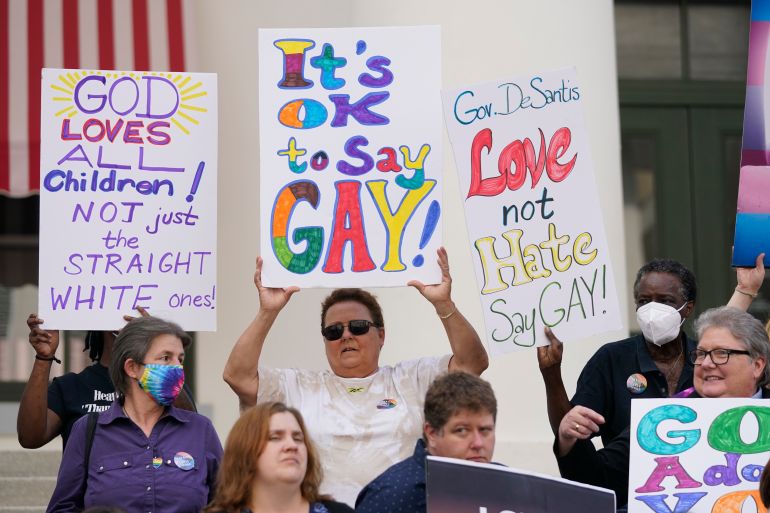What is the US state of Florida’s so-called ‘don’t say gay’ bill?
The bill would limit discussion of sexual orientation and gender identity in classrooms in the state.

Employees of The Walt Disney Company have called on the business to “do more” about legislation in the US southern state, Florida, that would limit classroom discussion of sexual orientation or gender identity – dubbed by opponents the “don’t say gay” bill.
They are demanding that Disney show its support for its LGBTQ+ employees by ” stopping construction and investment in the state of Florida until hateful legislation is repealed”.
Keep reading
list of 3 itemsAre anti-gay witch hunts really protecting ‘African values’?
Kenya court delays decision on anti-gay sex law
They also asked the company to stop efforts to relocate workers to Florida, and that “no employee will be terminated when denying relocation.”
Earlier this week, they staged walkouts across the country amid condemnation over Disney CEO’s slow response to the legislation, officially named Florida’s Parental Rights in Education, which passed the state Senate in early March and is supported by Florida Governor Ron DeSantis.
Disney has since suspended political contributions in Florida. Following the walkout, the company released a statement saying it opposes “any legislation that infringes on basic human rights”. Disney added that it was “in solidarity” with LGBTQ+ employees.
What’s in the bill?
The bill limits “classroom instruction” on “sexual orientation or gender identity”.
It says such instruction “may not occur in kindergarten through grade 3 or in a manner that is not age-appropriate or developmentally appropriate for students in accordance with state standards”. It does not specify when such instruction would be considered age-appropriate.
It also prohibits “classroom discussion about sexual orientation or gender identity in certain grade levels or in a specified manner”.
The bill allows parents to sue a school district, at the school district’s expense, if they believe the measure is not being enforced.
The bill also prohibits school support service personnel from withholding information regarding a student’s “mental, emotional, or physical health or well-being”.
That means school counsellors would have to inform parents if a student told them they were gay or trans, even if such disclosure could be harmful to the student.
What do supporters say?
Republican state Senator Dennis Baxley, the bill’s sponsor, has framed the legislation as reinforcing parents’ right to control the upbringing of their children.
In previous hearings, he has suggested that an emphasis on gender identity encourages kids to try “on different kinds of things”.
He has rejected the “don’t say gay” nickname, saying the bill does not actually use the word “gay”.
What do opponents say?
Opponents have said that beyond creating a dangerous environment that makes discussion of sexual orientation taboo, the bill is overly vague.
It does not define “sexual orientation” or “gender identity”, leaving what is prohibited open to interpretation.
A joint statement by the American Foundation for Suicide Prevention and the LGBTQ awareness organisation warned the law could harm a community that already reports high rates of seriously considering suicide.
“Researchers largely agree that at least part of the reason for the elevated rates of suicidal thoughts, plans, and attempts, and poor mental health outcomes found among LGBTQ people is the social stigma, prejudice, and discrimination that contributes to the minority stress of being LGBTQ,” the groups said.
I want every member of the LGBTQI+ community — especially the kids who will be impacted by this hateful bill — to know that you are loved and accepted just as you are. I have your back, and my Administration will continue to fight for the protections and safety you deserve. https://t.co/OcAIMeVpHL
— President Biden (@POTUS) February 8, 2022
“The escalation of state policies that are harmful to LGBTQ people will only heighten and intensify experiences of rejection and discrimination and could lead to an increase in suicidal ideation.”
The passage of the bill also prompted a response from the White House with US President Joe Biden calling it “hateful legislation” in a tweet, promising his administration would “continue to fight for the protections and safety” the LBGTQ+ community deserves.